#Albanian port
Explore tagged Tumblr posts
Text

Albanian bride from Zadrima/ Nusja Zadrimore
Photo: Lesh Prendi
1987
#Albanian#albanian women#albanian clothes#zadrima#zadrimore#llesh prendi#Kosovo#old photos Albania#traditional clothes Albania#traditional clothing#Albanian traditional clothing#Albanian port#balkan#balkanism#fashion#old fashion#vintage fashion#Albanian costumes#Albanian history#bride zadrima#nusja zadrimore#Albanian culture#Leonora Cuv
415 notes
·
View notes
Text

Shop in the Jewish quarter of Monastir (Bitola), Macedonia, ca. 1912
Monastir was situated on one of the ancient trade routes of the Balkans (the Roman "Via Egnatia") which went from the Albanian port of Durazzo to Salonika and Constantinople. Although (Hellenized Romaniote) Jews had lived in Monastir from Roman times and were joined by Hungarian Ashkenazim and Jews from Asia Minor in medieval times, the Sephardim, who originally migrated from the Iberian Peninsula in the fifteenth century, became the predominant Jewish group in the the city. This unique community with its several synagogues, diverse social and cultural institutions, as well as a rich Ladino folklore with some Turkish-Ottoman admixture, was wiped out during the Holocaust; the approximately 3,500 Monastir Jews were deported to Treblinka on April 5, 1943. In 1952 there lived only two Jews in the town.
118 notes
·
View notes
Text
#migrants#migrant arrivals#offshore asylum processing#albania#italy#italian naval vessel libra#shengjin
2 notes
·
View notes
Text
European Commission President Ursula von der Leyen has said the EU could "draw lessons" from a contested Italian policy of processing migrants offshore in Albania, as leaders of the 27 member states hold an EU summit focusing on migration.
Ahead of the Brussels summit, she wrote to EU leaders to say the EU's executive would present a new proposal for legislation to increase deportations of migrants..
Italy has begun sending some migrants to a processing centre in Albania earlier this week.
Sixteen men were transferred to the Albanian port of Shengjin on Wednesday, but hours after their arrival it emerged that two were minors and two more were medically vulnerable and would therefore be returned to Italy.
Other EU countries have begun considering ways to process migrants in third countries.
On Wednesday, the Dutch government said it was weighing up a plan to send rejected asylum seekers to Uganda.
By framing this week's summit around the issue of migration,von der Leyen - who is starting a second five-year term as European Commission chief - appears to be responding to pressure on migration from across Europe.
In her letter to member states, von der Leyen said the return rate of irregular migrants from EU countries is currently only about 20% - meaning the vast majority of people who are ordered to leave an EU member state do not.
Member states should all recognise the decisions taken by other EU countries to ensure that "migrants who have a return decision against them in one country cannot exploit cracks in the system to avoid return elsewhere", von der Leyen wrote.
Under the Italy-Albania scheme, some of the migrants rescued in the Mediterranean will be sent to Albania where their asylum claims will be examined.
The two processing centres, which cost about €650m (£547m), were due to open last spring but were plagued by long delays, have been paid for by the Italian government and will be operated under Italian law.
They will house migrants while Italy examines their asylum requests. Pregnant women, children and vulnerable people will be excluded from the plan.
Political opponents of right-wing Italian Prime Minister Giorgia Meloni as well as several NGOs have criticised Italy's deal with Albania.
Riccardo Magi, an MP with the left-wing +Europa party, said the Albania scheme was "cruel, useless and expensive", while NGO Doctors Without Borders said it was "likely to result in further harm and violation of human rights".
Civil rights activists gathered near the Italian-built centre in Shengjin carrying a large banner reading: "The European dream ends here."
However, addressing MPs on Tuesday, Meloni argued that the plan was "a new, courageous, unprecedented path" which "perfectly reflected the European spirit".
The implementation and the results of the Albania agreement will be watched closely by many EU member states, several of whom have attempted to respond to a surge in support for far-right parties by hardening their rhetoric and their approach to migration.
In the last few weeks alone, Germany reintroduced land border checks, the French government said it would look into tightening immigration legislation and Poland announced a plan to temporarily suspend the right to asylum for people crossing the border.
Polish PM Donald Tusk said the controversial move was meant to stop Belarus from "destabilising" Poland by allowing large numbers of migrants into the country.
In France and Germany, it was grisly murders which prompted calls for tougher action on immigration. A Syrian failed asylum seeker stabbed three people to death in Solingen, while a young student was murdered by a Moroccan national near Paris. In both cases, the killings were carried out by men who had been given expulsion orders that had not been enforced.
Last month, 15 member states signed a proposal by Austria and the Netherlands to improve the "efficiency" of the deportations system.
2 notes
·
View notes
Text
The Bulgarians, inwardly, perhaps, still dissatisfied, seemed outwardly content and attached to the Porte in the midst of the revolutionary movements that alternately convulsed the Servian, Greek, and Albanian populations. A very small section alone yielded to the influence of the foreign agents or comitats, who were using every means to create a general rising in Bulgaria, or was at any time in the Bulgarian troubles enticed to raise its voice against the Ottoman Government and throw off its allegiance. The late movement is said to have received encouragement from the Bulgarian clergy acting under Russian influence, and from the young schoolmasters, whose more advanced ideas naturally led them to instil notions of independence among the people. But these views were by no means entertained by the more thoughtful and important members of the community, and no organized disaffection existed in Bulgaria at the time the so-called revolt began. The action of a few hot-headed patriots, followed by some discontented peasants, started the revolt which, if it had been judiciously dealt with, might have been suppressed without one drop of blood. The Bulgarians would probably have continued plodding on as faithful subjects of the Porte, instead of being made—as will apparently be the case—a portion of the Slav group. Whether this fresh arrangement will succeed remains to be seen; but according to my experience of Bulgarian character, there is very little sympathy between it and the Slav. The Bulgarians have ever kept aloof from their Slavonic neighbors, and will continue a separate people even when possessed of independence.
The limits of Bulgaria, which must be drawn from an ethnological standpoint, are not very easily determined. The right of conquest and long possession no doubt entitles the Bulgarians to call their own the country extending from the Danube to the Balkans. South of that range and of Mount Scardos, however, i.e., in the northern part of Thrace and Macedonia, their settlement was never permanent, and their capital, originally established in Lychnidos (the modern Ochrida), had to be removed north of the Balkans to Tirnova. The colonies they established were never very important, since they were scattered in the open country as better adapted to the agricultural and pastoral pursuits of the nation. These settlements, forming into large and small villages, took Bulgarian names, but the names of the towns remained Greek.
10 notes
·
View notes
Text
Brazil’s biggest drug gang has gone global
The First Capital Command is now a mafia with links throughout Europe
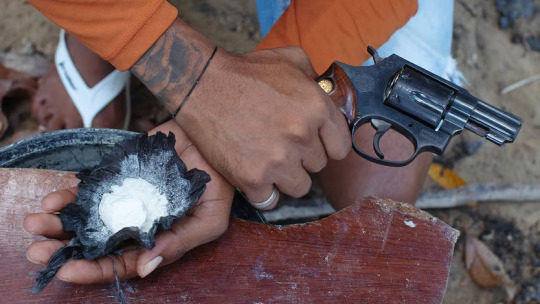
Football matches are tense affairs in Brazil. That is doubly true when they take place in prisons. In August 1993 a game in a São Paulo jail ended in horrific fashion. Eight inmates attacked their opponents, killing at least two. Covered in blood, they proclaimed the birth of a new gang: the First Capital Command (PCC). Thirty years later the PCC is Latin America’s biggest gang, with estimates suggesting it has 40,000 lifetime members and another 60,000 “contractors”. That would make it one of the world’s largest crime groups. And on November 6th a leaked report by Portugal’s security services claimed the group has 1,000 associates in Lisbon, the capital. The PCC is going global.
The gang’s network of allies began in South America. A decade ago the PCC formed an association with some of the world’s biggest cocaine-traffickers. Based in the Bolivian city of Santa Cruz, this “super gang” is dedicated to joint ventures in drugs and money-laundering. Local media thought it sounded like Mercosur, the regional trading bloc. They named it “Narcosur”. The PCC has separate relationships with Venezuela’s Tren de Aragua, a human-trafficking group, too.
But in recent years, the PCC has concentrated on building ties with Europe. In 2021 a record 303 tonnes of blow were seized in the European Union (see chart). The farther it is shipped, the bigger the margins. Previously the PCC bought coke wholesale in Bolivia for $1,500 per kilogram, got it onto a ship in a Brazilian port, and sold it on for $8,000 per kilogram. By setting up a base in Europe, members can sell that kilogram for over $30,000.
Members of the PCC are thought to be present in half a dozen European countries, including Britain. The gang runs over 50% of Brazil’s drug exports to the continent, says Lincoln Gakiya, an organised-crime prosecutor from São Paulo. It mostly works with Italy’s ‘Ndrangheta, Europe’s biggest mafia. The two syndicates have partnered for years. ‘Ndrangheta brokers are regularly arrested in Brazil, where they make hefty deals. In May an investigation by Europol, the EU’s police agency, revealed that the ‘Ndrangheta was shipping the PCC guns from Pakistan. It collaborates with Albanian and Serbian drug gangs, too.
Continue reading.
#brazil#brazilian politics#politics#public security#drugs#mod nise da silveira#image description in alt
13 notes
·
View notes
Text
Midsummer Night
A Legacy of Gods Fanfic
JerCes Daughter x LanMia Son
Chapter 8

Theodore Sokolov King
My Grandfather's house in the US had always been my sanctuary, whenever my mind decided to have a battle against it's ownself, or whenever I needed an escape from acting normal all day, when in reality I'd wanted to maim, hit and destroy or set everything around me on fire.
My Grandfather, Kyle Hunter, was a notorious assasin with a perfect aim. Besides my father, it was him who understood me, atleast better than most of my relatives. Here I'd always find an outlet and once I was done with my episode, I'd return back to role of the "Charming Heir of the Kings" , a role I played so well that even my mom and my sister Gina believed it to be my true nature, my true self. Here I could be whoever I wanted to be, unlike in the UK ,where I had my Grandfather Aiden and Grandpa Levi's eyes on me and the way I handled my business. While most of the times I'd ignore their meddling, at times it became too tiring.
"Something troubling you back home?" My Grandpa Kyle asks me in a jovial yet concerned tone.
We're sitting at the dining table, my grandmother hovering around the kitchen throwing instructions about how everything should be cooked as per my liking. My grandmother, Rai, is one of the strongest women I've seen in my life authorative like a lioness yet kind when needed . I wonder how she's able to do that.
"Judging by the amount of time we've known each other, old man, you should know that it's the other way round. I'm the trouble at my home"
Grandpa laughs "That's true too. Although we're glad that you could grace us with your presence, admist all the chaos that's unfolded at the Kings household during the past few days, I'm inclined to think that this time, your visit has a purpose."
"You're right Grandpa, my visit does have a purpose." I say taking a sip of my coffee, "I've heard that the Albanians and the Bratva have reached some kind of agreement and are now content with their specific…areas of control"
I can see a frown forming on my Grandpa's face, his expression one of confusion "You've heard right, but why are we talking about the Albanians? Theo, don't tell me you got into a beef with those bastards, they're illiterate barbarians" My Grandpa adds, exasperatedly.
"I haven't gotten in a beef with them yet, but I plan to get into one, pretty soon"
My Grandpa looks at me as though I've grown two heads "What? Boy, have you lost your mind?? What business do the Albanians have with you guys, aren't you a King? Prim, proper and all that shit? Why get into trouble unnecessarily? Is your Psycho father aware of your plans, your Grandfather Aiden?"
"The King Enterprises have come across a challenge, of sorts. The southern ports in UK are controlled by Mr. Abazi, the Albanian business man. While previously, we'd sort of had an agreement, Abazi now feels emboldened enough to challenge us, I need to put him back in place and at the same time make an example out of him so that rats like him don't feel too ambitious in future"
"And that cannot be done, like normal businessmen do it, with talks and negotiations" Asks Grandpa
"Isn't Bratva a business organization of sorts too? Yet we can see it's approach towards handling such lowlife thugs?" I add with a smirk
"You and I, we're both aware what the Bratva stands for, I don't need to say it out loud for you to understand. I sometimes regret exposing you to this part of our lives, Dom didn't have a reason to not embrace our lifestyle, but you do son. Your life back home might have it's own disadvantages, but it's nowhere near as dangerous as ours, be content with what you have, don't go around causing unnecessary trouble just because you're feeling adventurous"
After a long stretched pause, he slowly asks "Does your Mom know you're here? You know how concerned she gets whenever you try to associate with the Bratva business, and rightfully so. Stop giving my princess an headache every now and then" He playfully punches my shoulder.
I give him a small smile. Taking in a breath I add "I need your help, Grandpa. I want you to plant a spy within the ranks of Abazi, and then spread rumors, that Abazi has something that could bring the Volkovs to their knees"
My Grandfather runs his hands through his face "Oh dear God, as if the Albanians are not enough, you want to pick up a fight with the Volkovs too?, we need to get you checked, boy, there's something seriously wrong with you, why involve the Volkovs in this?"
"I need the Volkovs on my side, for whatever I propose in the next Bratva meeting, this is most crucial for my plans to be effective"
He takes time, thinking about it. But I know he'll help me, he always does.
"OK, I'll try my best to help you, in whatever ways I can, but I'm still not very comfortable with your approach towards the Volkovs, if Jeremy or Adrian get a hint of this, It'll almost be impossible for me to save you, and while you don't care a bit about your life, we all do"
"Now, why would the Volkovs want to hurt their Future Son-in-law?" I add with a grin on my face.
My Grandfather chokes on his coffee, a bewildered expression on his face, I hand him the glass of water and pat his back.
"Did you say Volkovs Son-in-law, or am I Hearing things?"
"You heard me right Grandpa, I'm getting engaged to the Volkovs princess" I say with a smirk.
That's the exact time my grandmother choses to enter the dining room, she almost runs to my side "Did I hear it right, you're marrying Lia's granddaughter? Is this true? Does Lia know?"
"Yes, I'm planning to get engaged to Aanya Volkov, She hasn't put this proposal infront of her parents, but she'll be doing so soon"
"She's such a pretty girl, soft spoken, yet courageous. I always admired her and wanted to ask her hand in marriage for Dom so that she becomes a part of our family , but I wasn't sure how Adrian or Jeremy would react to the propsal. I'm so glad that you propsed her, this is such a great news, isn't it Hon?"
"Wait.Both of you need to hold your horses, you said that Aanya is still to inform at her home about you two?"
"Yes"
"Then let's wait before celebrating… whatever this is. The girl is literally the most protected one in the entire Bratva, why do you think not a single boy's ever approached her in ages, it's because she's Jeremy Volkov's daughter, and we're already aware of how much tolerance he has towards your father and your family, the only reason that no blood's spilled yet is because Annika is married into that family of yours, and yet you want us to believe that you've somehow managed to pull this impossible feat of asking her hand in marriage, I don't believe you"
"I'll be sure to sent out my engagement ceremony's first invite to you Grandpa, don't worry"
"Jeremy will kill you, Boy. He won't tolerate you messing with his precious daughter, so take my advice to heart and stop this madness before you're buried 6ft under"
"Kyle! How can you say something like that?"
Bless my Grandma, the only one on my team for now.
"Just stating the facts, my love. You know that I love my Grandson, and would fight tooth and claw before allowing anyone to lay a hand on him. With all that said, we'll have to be well prepared, son, if you're going to go through this engagement."
"And we will be prepared, don't you worry Theo, you'll always have our full support " My Grandma says in her loving tone."I'm so happy, Theo, I'm glad Aanya could catch your eye, I hope nothing but the best for you two, may your lives be full of passionate love"
"The Volkovs are yet to say yes to this" grumbles Grandpa
"Oh hush you, they will say yes I'm sure. After all my Grandson is handsome like a prince, has a fortune to his name, is smart, brave and well built, where else would they find such a perfect match?"
"I'm sure Jeremy would disagree, my love"
My grandparents continue to bicker back and forth, and I keep watching them with amusement. While I was able to convince my grandparents that ours is a love match, the story would be completely different at my home. My father and Grandpa Aiden would definitely see through my bullshit.
Hopefully Aanya convinces her family before time, or else I'd have no option but to turn the odds in my favor, using not so pleasant methods.
#rinaverse#landon king#jeremy volkov#cecily knight#mia sokolov#adrian volkov#aiden king#royal elite series#legacy of gods#rina kent#fanfic#brandon king#nikolai sokolov
5 notes
·
View notes
Text

Kula Redžepagića, side view
Plav, Montenegro
The wooden projections served as separate elements for various functions; one served as a food preparation area, and another as a toilet, and the third as a čošak, a bay for sitting with views and daylight to entertain and work. The small slits in the masonry served as rifle ports when the kula was under siege. Plav, sits to the east of Lake Plav in the mountainous area near the Albanian and Serbian borders. The kula building type is also found in Albania, Serbia, and Bulgaria. Skilled builders from Debar in Macedonia reputedly constructed the kulas in the Plav region. (photo 1988)
23 notes
·
View notes
Text
Albania’s Constitutional Court ruled on Monday that the protocol on migrants agreed with Italy was constitutional after it had reviewed two aspects, the physical aspect and the legal aspect regarding Albanian sovereignty.
“First, it assessed that the Protocol on Migration does not set territorial borders nor does it change the territorial integrity of the Republic of Albania, so it does not constitute an agreement that has to do with the territory in the physical aspect,” it ruled.
“Secondly, the Constitutional Court assessed that in the two areas where the Migration Protocol operates, Albanian law is applied, in addition to Italian law,” it added.
The deal concerns the hosting and processing in Albania of refugees and migrants picked up at sea by Italian ships.
The case went to the Court on the request of opposition Albanian MPs. Since it was first presented by Albania’s Prime Minister, Edi Rama, and Italy’s Prime Minister, Giorgia Meloni, in Rome on November 6, the deal has been criticised for a lack of transparency and public consultation and, over its legal aspect, over whether it would violate Albania’s sovereignty over its territory.
A group of 29 organisations addressed the Albanian government on November 15 in an open letter where they demanded withdrawal from the agreement, saying it would violate human rights and involve wrongful imprisonment.
The protocol specified certain conditions and the costs that the construction, maintenance and operation of the two centres will entail.
According to the text, construction of the hosting and processing structures will cost the interior Ministry €31.2 million and the Ministry of Justice €8 million. Italy would allocate €9.4 million for the year 2024 for the equipment for the functioning of the centres.
A centre at the port of Shengjin will handle procedures and identification, similar to the “hotspots” Italy has been using for several years, which the European Court of Human Rights condemned on March 30.
Gjader, in northwestern Albania, will host those who, after identification and screening, are not deemed suitable for protection. The centre will operate similarly to Italy’s Repatriation Centres, where migrants are detained until repatriation – a complex procedure widely deemed ineffective.
Those awaiting repatriation under Italian law may be detained for a maximum of 18 months. The deal states that if the right to stay in the facilities ceases to exist, Italy must immediately transfer the migrants out of Albanian territory.
2 notes
·
View notes
Text
Saimir Kristo: Architecture Is The Means To Create A Common Language Of Living
Weltraum, a radio podcast about space on the jabbering Independent Coastal Radio NOR hosted Saimir Kristo ... I had this great opportunity to talk about the city, his ideals and thoughts.

Saimir Kristo | Photo © Kristiana Meço
How Tirana changed in last 20 years?
Saimir Kristo: Talking about the weather it was much more rainy. It used to be the rainy city in Albania twenty years ago, when I come back from Greece. It changed radically. In 2004 there were not even proper bars. Of course nobody cared about the bars in that time, the country was just going out of a difficult period from the civil war in 1997, where pyramid schemes tricked citizens and took away their money. Fifteen years ago I am not really sure if we were not able to escape from this closed territorial system but today is the other problem, that people are leaving, there are massive emigrations. The problem I face as an individual but also as an architect in the last twenty years working in remote areas of Albania.
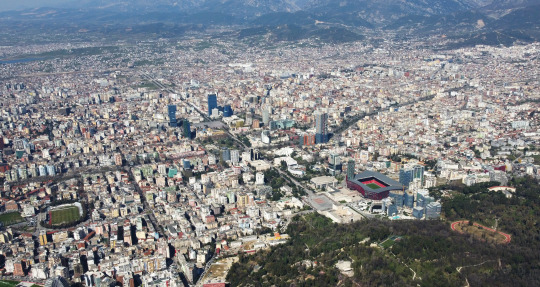
Tirana Aerial View | Photo © Open House Tirana
When I come back there was this amazing energy where people from Albania want to change the country, they wanted to go out from those enclaves from the past. There were many cases of informality in the 1990s, many cases of wild development, but there were people with the amazing energy. Whenever we have problems and we have the energy, we can always solve all problems because we have people around to solve it together. What about if you have depth and you go to the rural areas of Albania? Those villages were very much present in the landscape of the county but today are almost empty. Villages of once 1.000 inhabitants have now only thirteen people.
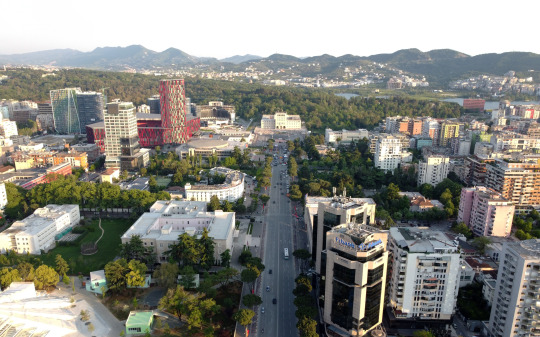
Tirana New Boulevard | Photo © Open House Tirana
The intention to move into big urban centres in the 1990s was very huge, it was a huge mass immigration. Today it's starting again. When I moved to Tirana there was just almost a half of a million people, reaching today a number of one million. So from 2,5 million Albanians that have left the county one million lives between Tirana and Durrës, the main port city. And we have 29.000 km2 of the territory. This is an important way to speak how Albania changed.
It is not always about architecture?
SK: I think is barely about the architecture. Architecture it is the means to justify, to camouflage, to improve and to manifest that people are much more sensitive about it. It is the means to deconstruct mentalities but also a means to educate to improve the settings and create a common language of living, of being. All these years of architecture in Albania, not as innovative approach because if was used in a part, is used in a way to transfer the identity of the city. I have a very famous image in mind, in 1990 when the main Skanderberg square had only pedestrians, only one bus and one truck.

Skanderbeg Square during daytime.| Photo © Open House Tirana
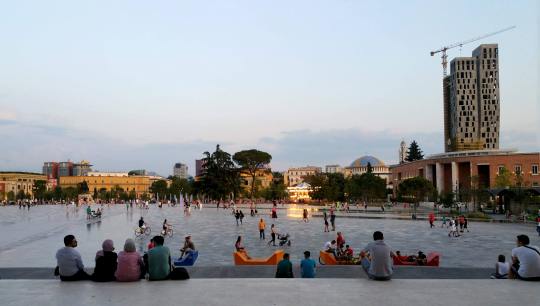
Skanderbeg Square changes it's identity during the evening.| Photo © Open House Tirana
Architecture is the means to justify, to camouflage, to improve and to manifest that people are much more sensitive about it. It is the means to deconstruct mentalities but also a means to educate to improve the settings and create a common language of living, of being.
People were thinking we had a very organised square with the right amount of people (whatever that means), a public transport with one bus. What if we go back to this situation? That can be very dangerous, because the Skanderberg square didn't had cars because people didn't want to use cars but because no one have a car easily. People also didn't feel the square as a public space but a main space for demonstration of the propaganda of the authoritarian regime of Hoxha. In the same way are the public spaces today, they might seem more contemporary organised but they are made only for events, either a political meeting, music concert or sports gather.
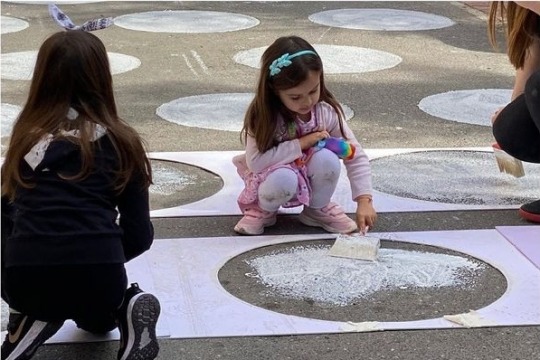
Urban Streetscapes: Filter Caffee Filtre | Photo © Tirana Architecture Triennial
The real life in squares makes them lively after midnight or early morning, where there is no urgency to be there but just a pure pleasure or desire. Architecture was and it still used to express political dominance and authority. To have a beautiful architecture we have to present it and experiment. I don't like the word educate, I think to have this relationship of co-ownership of projects that people really want.
The real life in squares makes them lively after midnight or early morning, where there is no urgency to be there but just a pure pleasure or desire.
As an educator you work in an educational institution, how is educational system about architecture in Albania functioning?
SK: It is situated on a dogma of the repetitive reproduction of something before, which is also linked to today, because students tend to limit their creativity because of the restrict educational system and their project doesn't resemble the project of their professors. This is a problem of us, educators. We have to change that. We continue to teach students what we were thought twenty, thirty years ago. We need to transform radically they way we do it. We shall focus on the importance of reading, going in depth of students ideas and expressions. Then students can find right tools to express better. We always try to copy what is present as innovative. It is on us, professors to educate ourselves more, read more and listen more. This is the the problem of architects, they don't listen so much but tend to speak.
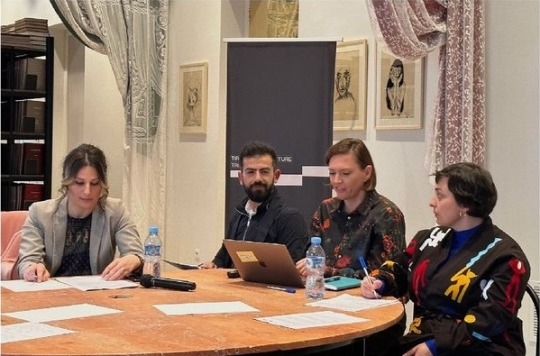
Roundtable Virtual or Physical; from left to right Etleva Dobjani, Saimir Kristo, Dijana Vučinić, Tinatin Gurgenize. | Photo © Tirana Architecture Triennial
The other topic, which I am very critical about, is the issue of non payed work. This has became a standard. We teach students to be aware of how much they need to be payed to be able to value their work. These are things that were never talked before in the auditorium.
Maybe LINA is the good opportunity for that; what did LINA created for Bartleti?
SK: Some of our LINA fellows presented the issue of inclusivity and education, which makes me very proud of. For Bartleti LINA collaboration makes a very important presence for bringing fresh ideas from incredible fellows with a high level of integrity and professionalism. On the other side this enhanced courage to our students to work with these topics and collaborate with the others. It is a case of asking question in a classroom and feeling a prejudice why are you asking this question. If you see other people having the same question, the you are part of the community. The other important issue is a continuous collaboration with other institutions that are part of LINA. I always have called this more that European union of architecture, because it extends beyond Europe.

Space Saloon + The MAAK | Photo © Tirana Architecture Triennial
International collaboration can not only be used as a mean to justify but can also be used as a means to go further, to look beyond and investigate a very delicate problem. Last year we had an opportunity to host New South with the issue of Sacred grounds.

Sacred Grounds by New South. | Photo © Tirana Architecture Triennial
We have this phenomenon of reduced co-existance in Albania. We have four different religions, which all cohabitate together. This is because our dictator abroad the religion in the 1960s, so when there was no religion, they need to find a common language to keep their faith inside them. In the New South's installation in the National historic museum, the most dictatorial building in Albania, presented all these four religion and in such way created a non physical temple for people of all these four religions inside an extra dogmatic building. We try to touch not only the build aspect but also how we perceive the space.
What kind of act is the demolishment of the National Theatre of Albania that happened few years ago?
SK: The demolition of the National Theatre was a collective act. It was not just an act to build a new theatre. It is not only an act by the government to transform a public space, get read of the old building or neglect it' s value. I think it's an act of us as architects, us as citizens of Tirana, not to raise the attention to all other historical buildings that have been left to the mercy of time since thirty years now. It is something we need to reflect in our consciousness. We might not have the money to restore the building, as culture is the smallest portfolio in our government. We have to ask for more. Demolitions is not something sporadic, that happened with the theatre, this is happening with hundred of historical buildings in Tirana and all around Albania. (Saimir presented the Forgotten Masterpieces of Albania in some of our previous talks).
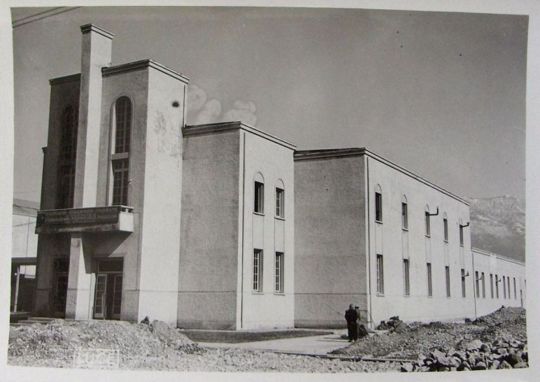
The National Theatre in Tirana. | Photo via Architectuul
We are always there in the last moment, when we know that there is one percent of chance to save it. We should emphasise the importance of thesis buildings and find a way to restore them. The city from twenty years ago it's not recognisable today. This is telling a lot about us, because to rebuild and restore takes a lot more time to discuss and work on that. In many levels the case of theatre is a consume story but it's also an inflation of our society and at the end you have one more building less to admire. The 17th of May 2020 at 4:30 in the morning, that's when the theatre collapsed, should not be the moment to ask the old theatre to be rebuild again in the place of the old one, but should be a moment to commemorate how neglected we were as a society and how important is to turn the attention on the city that we are taking advantage of.

Northern Boulevard Extension | Photo © Open House Tirana
The memory of the city is always important and we need to be able to pass over the memory of the story of the historical theatre to the next generations and not to romanticise the idilic idea of a new theatre by BIG. It is important of how to show the identity of our city.
How do you see architecture in the future?
SK: Beautiful! Why not! I am not part of the dramatic and pessimist discussions that architecture and our cities are getting worse. We have students that are not compromising themselves and they want to do a change. I want to Wellcome all the changes to see myself as a part of this evolving system. With new students working in the field of architecture we just have a bright future. What we need is to embrace all these things to feel them. We have to open our minds and to wake up. We have to keep the dream of our inner small Chile inside and working in architectural education we are responsible to keep that dream of all these young students alive and we have to foster it.
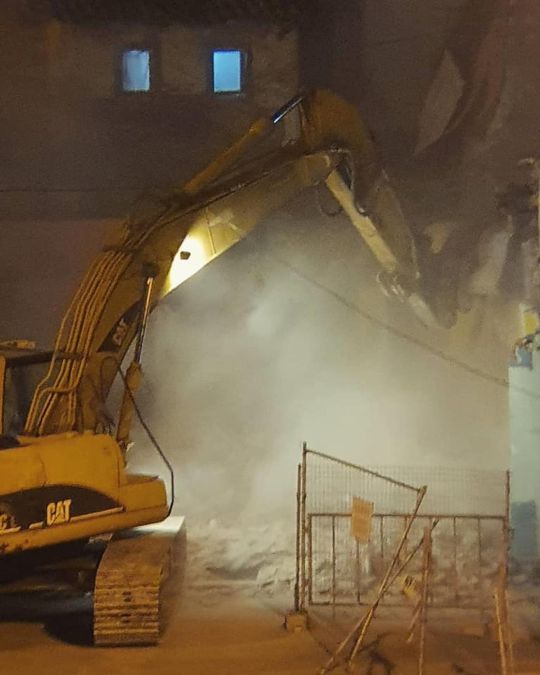
The National Theatre of Albania was demolished on 17. May 2020 at 4am. | Photo © Saimir Kristo
Saimir Kristo, P.hD. is an architect and urban designer, currently Deputy Dean and Lecturer at the Faculty of Applied Sciences and Creative Industries at BARLETI University. Founder of Tirana Architecture Triennale - Architecture Fund in Albania and Open House Tirana. He is an APLS Alumnus invited by the Austrian Ministry of Foreign Affairs and IVLP Alumnus invited by the US State Department representing civil society in Albania. As an active member of civil society, he is engaging communities to develop a common educational platform in the field of architecture and urban planning. His professional practice IXI Architecture is working in tangible and intangible mediums to transform urban design and architecture in Albania for the better. He holds a Ph.D. in Architecture and Urban Planning Focused on city morphology and urban catalysis and their role in the transformation of public spaces, a research result of his experience as a project leader in Urban Regulatory Plans in Albania. His scientific activity extends with monographs and publications but also as a jury member in international competitions. He serves as the Independent Nominator for the “EU Mies van der Rohe Award” appointed by the Fundacio Mies van der Rohe for Albania. Since its establishment, he has been a board member of "Fundjavë Ndryshe" foundation.
Here You can listen to the WELTRAUM interview.
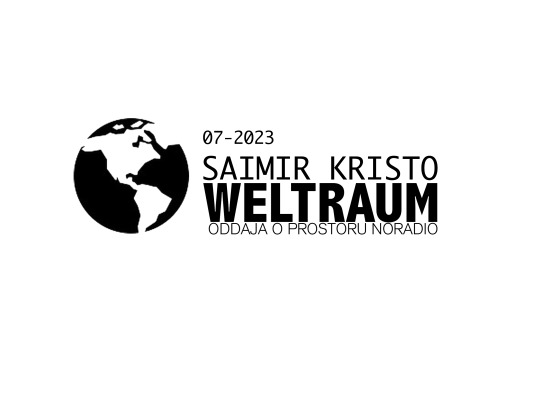
2 notes
·
View notes
Text
Dozens of migrants leave Albania after Italian court ruling
SHëNGJIN, ALBANIA: Dozens of migrants left Italian-run facilities in Albania on Saturday after judges in Rome refused to approve their detention, in another setback for Prime Minister Giorgia Meloni. An Italian boat carrying 43 migrants departed from the Albanian port of Shengjin for the Italian port of Bari, according to an AFP journalist. The migrants arrived in Albania on Tuesday, the third…
0 notes
Text
An Italian navy ship arrived in Albania on Tuesday taking 49 migrants intercepted in international waters for processing of their asylum applications at special Albanian centres, the third such attempt following hurdles earlier raised by Italian courts. Italy’s Interior Ministry did not specify the nationality of the migrants taken to the port of Shengjin, 40 miles (66km) north-west of the capital, Tirana, but Italian media said they were from Bangladesh, Egypt, Ivory Coast and Gambia. The attempt at processing in Albania follows two previous failures in October and November, when Italian judges refused to approve the detention of two small groups at the Albanian centres, built under a contentious agreement between Italy and Albania. The courts ruled that the migrants’ countries of origin were not safe enough for them to face the possibility of being sent back by the centres. The cases have been referred to the European Court of Justice, which earlier established that asylum applicants could not undergo a fast-track procedure that could lead to repatriation if their home countries are not deemed completely safe.
continue reading
0 notes
Text
Italy sends 49 more migrants to Albania for processing following earlier court rejectionson January 28, 2025 at 7:02 am
An Italian navy ship arrived Tuesday in Albania with 49 migrants intercepted in international waters for processing of their asylum applications at special Albanian centers, in the third such attempt following hurdles earlier raised by Italian courts. Italy’s Interior Ministry did not specify the nationality of the migrants brought to the port of Shengjin, 66 kilometers (40 miles) northwest of…
0 notes
Text
Italy Shortshers to restore people to Albania | Story
The Italian's 49 ships in Albania Champion under 2023 to resolve between Rome and Tarani. The Navian Weap Shipr tip 49 people in Albanian port, as Rome resumptized to transfer the movement of Balkan. Italian officials said that the ship jumped to Dongjin Tuesday morning, and sent the group. It's the third Roman test to refuse Asylum as it says in Albania, long judgments were condemned last year…
0 notes
Text
Italy Shortshers to restore people to Albania | Story
The Italian's 49 ships in Albania Champion under 2023 to resolve between Rome and Tarani. The Navian Weap Shipr tip 49 people in Albanian port, as Rome resumptized to transfer the movement of Balkan. Italian officials said that the ship jumped to Dongjin Tuesday morning, and sent the group. It's the third Roman test to refuse Asylum as it says in Albania, long judgments were condemned last year…
0 notes
Text
Italy Shortshers to restore people to Albania | Story
The Italian's 49 ships in Albania Champion under 2023 to resolve between Rome and Tarani. The Navian Weap Shipr tip 49 people in Albanian port, as Rome resumptized to transfer the movement of Balkan. Italian officials said that the ship jumped to Dongjin Tuesday morning, and sent the group. It's the third Roman test to refuse Asylum as it says in Albania, long judgments were condemned last year…
0 notes